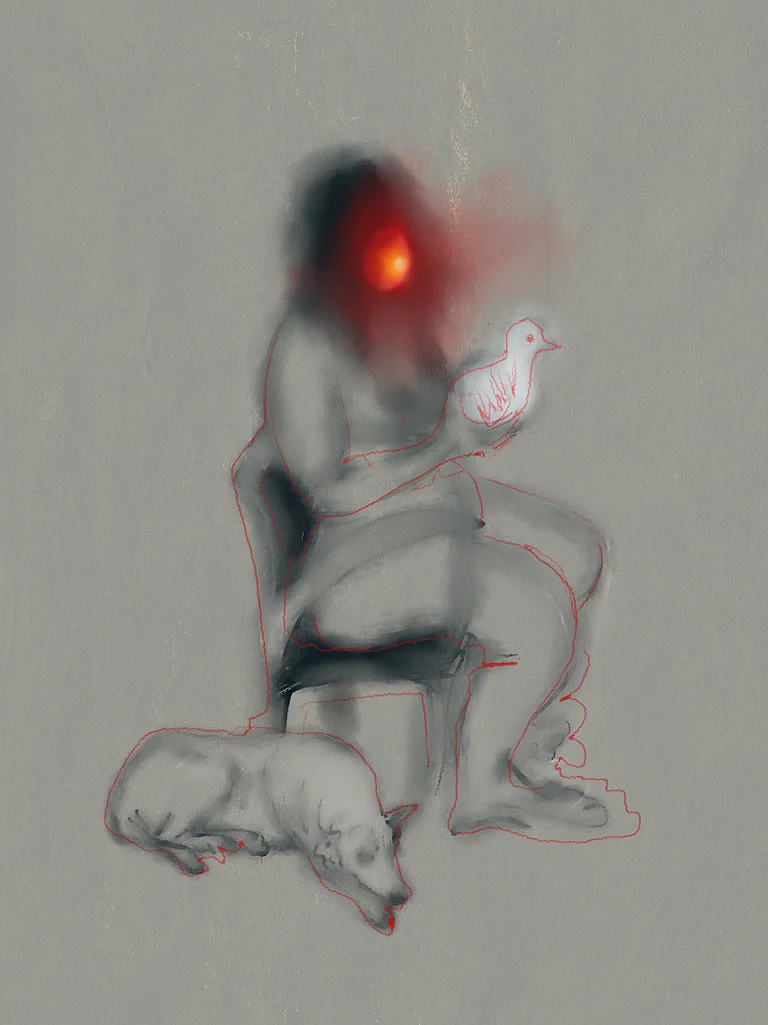Someone answered the call. After introducing myself, I asked if I could talk to Sajjad (name changed). A woman on the other side asked what it was about. The ‘love jihad case’, I said. She hung up abruptly. I tried to reach him again, but the calls went unanswered. But just as I tried reaching out to others booked under cases of ‘love jihad’, the phone rang again—Sajjad was calling. He promptly asked, “What do you want now? Haven’t you people destroyed my life already?” After a little cajoling, he agreed to talk.
“I was madly in love with a girl outside my religion, and so was she. That was my crime. We had been planning to get married for long. In 2020, some vigilante groups got to know about our relationship; they asked me to end the affair, and also informed the girl’s family,” Sajjad tells Outlook. The girl was immediately confined to her home and not allowed to step out. “In December that year, we eloped in the hope of getting married. But our happiness was short-lived. The right-wing vigilantes demanded my arrest. My family was dragged in. We finally had to return to our village in Bareilly district of Uttar Pradesh,” he adds. Used extensively by right-wing Hindu groups, the term ‘love jihad’ denotes an alleged conspiracy by Muslim men to lure Hindu women into marriage and religious conversion.
ALSO READ: Total Eclipse Of The Heart
Sajjad’s miseries didn’t end there. He was booked and sent to jail for over two months under the Prohibition of Unlawful Conversion of Religion Act, 2020, following a complaint filed by the girl’s family. The girl was also ‘pressured’ to validate the complaint against him, claims Sajjad. Meanwhile, she was married off to someone else. While narrating his ordeal, there was no anger for anyone. “While some Hindus were against us having an affair, there were others who supported me. As for me, it’s not a Hindu-Muslim issue, but about a hatred for love. My Hindu lawyer refused to buckle under threats and monetary offers to stop fighting my case. I work as a driver for a Hindu family in Noida; they know about the cases against me and are very supportive,” he adds.
All history has a prehistory
Today’s narrative of ‘love jihad’ has its origins in 1920s colonial India, according to a paper published in EPW by Charu Gupta, an associate professor of history at the University of Delhi. “In Kanpur in 1924, a Muslim administrator was accused of ‘abducting and seducing’ a Hindu girl and forcing her to convert. A Hindu group demanded the woman’s ‘rescue’ from the bureaucrat’s home. The ‘fake’ claim by the Hindu right, that there is a ‘love jihad’ organisation that is forcing Hindu women to convert to Islam through false expressions of love, is similar to a campaign in the 1920s against alleged ‘abductions’. Whether in the 1920s or in 2009, Hindu patriarchal notions appear deeply entrenched in such campaigns. Images of passive victimised Hindu women at the hands of inscrutable Muslims abound, and any possibility of women exercising their legitimate right to love and their right to choice is ignored,” Charu Gupta writes.
ALSO READ: ‘Laab’ In The Mountains
Gupta draws a parallel between “the tales in the 1920s and 2009”, when Shahan Sha of Kerala was charged for forcibly abducting and converting Methula, a Hindu girl. In both incidents, one of the arguments given by Hindu groups is that conversions of Hindu women are linked with rising Muslim numbers. A tract published in 1924 from Kanpur dwelt on the alleged decline of Hindu population due to increasing conversions of Hindu women to Islam. “It claimed that many Aryan women were entering the homes of yavanas and mlechhas (terms used for Muslims), producing (cow-killer) children, and increasing Muslim numbers,” Gupta writes in the paper titled Hindu Women and Muslim Men: Love Jihad and Conversions.
The return of the beast
More recently, another case of alleged ‘love jihad’ that gained national traction was the marriage of Hadiya with Shafin Jahan. Born to Hindu parents in Vaikom in Kerala’s Kottayam, Hadiya converted to Islam during her college days in Salem, much to the opposition of her father Asokan, who alleged the conversion was forceful. She married Shafin in December 2016. Her father’s petition in the Kerala high court was pending, alleging there were plans to transfer her to Syria. When the high court learned that she had married Shafin, it declared the marriage invalid and sentenced Hadiya to a women’s hostel in Ernakulam. Finally, the Supreme Court granted her permission to complete her medical degree, and allowed her to meet anyone she wanted. Eventually, after a lengthy legal battle, the apex court also upheld their marriage on March 8, 2018. After the verdict, Shafin Jahan wrote a post on his Facebook page, accompanied by a photo of Hadiya in a doctor’s coat and holding a stethoscope: “Finally, against all obstacles, you arrived at a significant destination. “I am proud to address you as a Doctor.”
The ballot of romance
Analysts believe that the ‘love jihad’ bogey was invoked—“Desh, bahu aur gai ko bachana hai…,” the war cry went—to ignite communal flames during the Muzaffarnagar riots of 2013. “When society could no longer bear the love of jihadists, a corrective movement—bahu beti bachao mahapanchayat—arose,” VHP chairman Ashok Singhal had told the media then.
Gilles Verniers, assistant professor of Political Science at Ashoka University and co-director of the Trivedi Centre for Political Data, wrote in an article titled How the Muzaffarnagar polarisation strategy paid off for the BJP (and why it’s being used again) that: “What is worrying is the potent mix of minority stigmatisation and concerns—both legitimate and fantasised—for the safety of women. Minor local incidents have been labeled as communal. This has been backed by baseless rumours aimed at blaming a single community for the threats to women.” The BJP won 71 of the 78 seats it contested in the 2014 Lok Sabha polls in Uttar Pradesh. Now that Uttar Pradesh and other states in India are gearing up for a fresh round of assembly elections starting next month, love jihad and conversion issues have again come to dominate the political discourse.

Photograph by Getty Images
Not just a Hindu-Muslim issue
Interestingly, the modern iteration of the canard of love jihad came neither from the Hindi ‘heartland’, nor from the febrile imagination of Hindu vigilantes, but from the Catholic Church of Kerala in 2009. More recently, the Bishop of Palai, Mar Joseph Kallarangatt, accused the state’s Muslim community of love and drug jihad to target Christians. A Delhi-based couple originally from Kerala asserted that while ‘love jihad’ as a political jargon is used to divide society for electoral dividends, the underlying cause of the problem has its roots embedded in patriarchy.
Asiya (name changed), who teaches at a University in Delhi college, says, “Our marriage does not fit in the larger love jihad narrative. However, as a Muslim woman married to a Christian man, my family has still not accepted us. My family assumes that I, as a woman, cannot choose to get married to a Christian. They believe my body and my existence is a repository of our collective (Muslim) honour, and anything against our religious sanction would bring dishonour to the family and community.”
ALSO READ: You Are Making My Grey Glow
Legislating to regulate the heart
On December 23, 2021, Karnataka became the latest BJP-ruled state to have passed a law to curb conversion. Other states with similar laws against conversion are Uttar Pradesh, Madhya Pradesh, Uttarakhand, Gujarat and Himachal Pradesh. The standard clause that unites all these states and their ‘anti-conversion’ laws is prevention of conversion by marriage. While anti-conversion laws have existed in India since 1967, Uttarakhand and Himachal Pradesh were the first states to include a marriage clause. Misrepresentation, force, fraud, undue influence, coercion, allurement or marriage are all prohibited under Uttarakhand’s Freedom of Religion Act, 2018. Himachal Pradesh followed, by enacting a similar law.
Uttar Pradesh received a lot of attention because of its ‘love jihad’ law, which sparked a nationwide political debate. Surprisingly, the law does not mention or define the phrase ‘love jihad’ though it makes forcible religious conversion (even through marriage) punishable by up to five years in prison, and a fine of Rs 15,000 fine. Furthermore, if the girl is a minor or belongs to the SC or ST, the sentence increases to a maximum of 10 years in prison and a fine of Rs 25,000. Mass conversions are also punishable under law, with perpetrators facing prison sentences of 3 to 10 years and fines up to Rs 50,000. However, critics believe these laws are meant to harass people from the minority communities, assuage caste Hindus’ fears about conversion to Christianity and Islam, and preserving caste hierarchy by preventing lower caste Hindus from switching to Buddhism.
According to Ghazala Jamil, assistant professor at Centre for Law and Governance at Jawaharlal Nehru University, “The new regulations were passed in states where the ruling BJP enjoys widespread support. The ruling party’s goal with these laws is to incite anti-Muslim feelings in these states. The recent law in UP exemplifies the escalation of these tendencies in the run-up to the state elections. The new anti-conversion legislation, notably the one in UP, is being debated against the backdrop of a false news campaign stating that Muslim males deceive Hindu women into marrying them for the sole purpose of overtaking the Hindu population and achieving demographic majority status in India,” she tells Outlook.
According to media reports, the new law that criminalises religious conversion has resulted in 108 cases being filed by UP Police in the first year since its enactment. Even as the noose tightens around inter-religious marriage in these states, in metro cities, such marriages continue to take place. A PhD scholar from Jamia Millia Islamia who wishes to remain anonymous, tells Outlook that he finds it challenging to find a house to rent after marriage with his long-time Hindu girlfriend. “It’s been a year since we got married, but we still haven’t been able to rent a house for ourselves. Landlords say they do not want to land in trouble by letting a house to an inter-faith couple. Finally, a friend offered us shelter,” he says.
Amid all this, ‘love jihad’ is yet to find a legal definition and continues to remain an oxymoron.
(This appeared in the print edition as "War Against Love")
ALSO READ


























